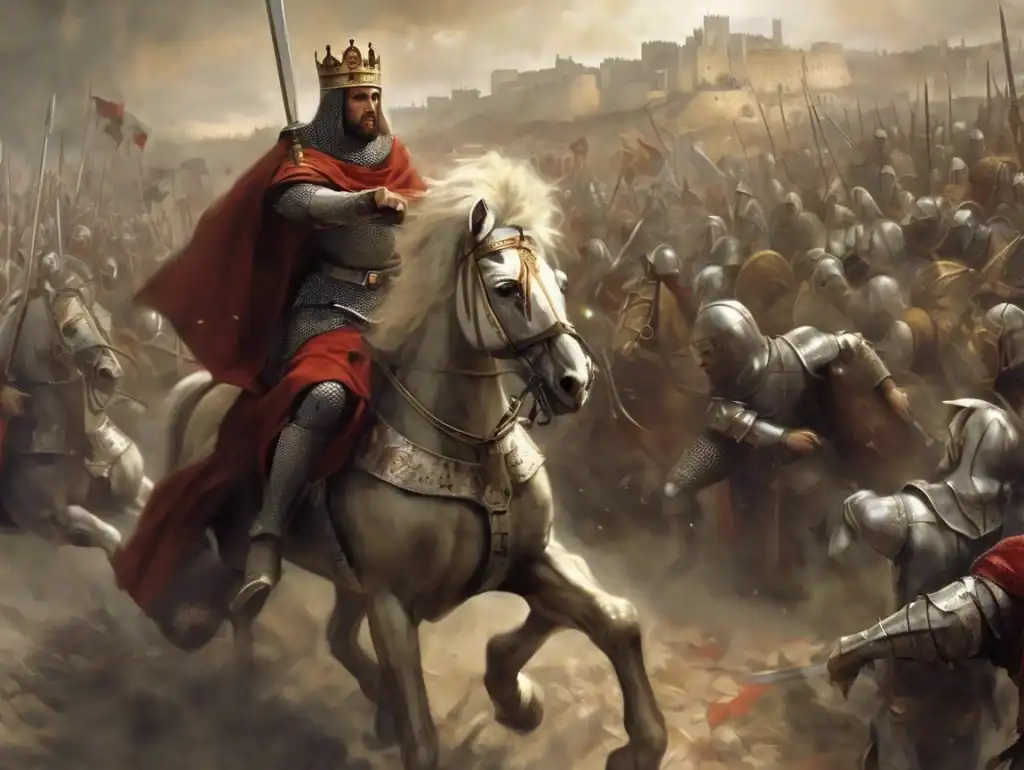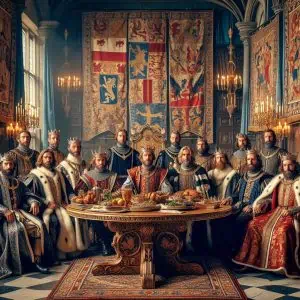When we think of medieval kings, it’s easy to imagine glittering crowns, grand banquets, and solemn oaths of loyalty. The truth, however, is far less romantic. The road to the throne was rarely a peaceful stroll through a royal garden—it was more often a dangerous climb up a blood-slick ladder. Wars, assassinations, shifting alliances, and ruthless ambition shaped the destiny of kingdoms far more than divine right or noble birth.

Kings weren’t just ceremonial rulers; they were strategists, warriors, and political gamblers whose power could rise or fall overnight. To survive, they needed cunning, charisma, and a willingness to crush their enemies—sometimes literally. And while not every king was a villain, the medieval political game rewarded those who played hard and punished those who hesitated.
1️⃣ Rightful Bloodlines? Not Really
👑 Forget fairy tales. Royal blood helped, but plenty of kings took the crown without a direct claim.
- Opportunistic nobles exploited weak heirs.
- Marriages were political weapons, not romantic tales.
- Winning battles often mattered more than ancestry.
💡 Did You Know?
William the Conqueror was called William the Bastard before 1066. His claim was shaky—but his sword was convincing.
2️⃣ Military Might Was Everything
⚔️ Kings were warlords first, monarchs second.
- Armies were the ultimate campaign slogan.
- Charismatic generals often became kings.
- Victory on the battlefield could erase political debts.
3️⃣ Coronations = Political Theater
⛪ The church’s blessing was as crucial as the crown.
- Coronations signaled divine approval—whether God agreed or not.
- Bishops and popes could legitimize (or delegitimize) a ruler.
- Religious rituals reassured people their ruler wasn’t just a thug.

💡 Did You Know?
Some kings staged miracles during coronations—like releasing doves—to “prove” divine favor.
4️⃣ Assassination Was a Career Move
🗡️ In medieval politics, “retirement” often meant a dagger in the back.
- Poisoned feasts and “hunting accidents” were common.
- Some kings killed brothers, cousins, or even children to secure the throne.
- Royal courts were as dangerous as battlefields.
5️⃣ Marriage Was a Weapon
💍 Love rarely had a seat at the royal table.
- Strategic marriages built alliances—or swallowed rival kingdoms whole.
- Dowries could include entire cities.
- A well-timed wedding could prevent a war… or start one.
6️⃣ Propaganda Was Medieval Social Media
📜 Control the story, control the crown.
- Minstrels, poets, and monks shaped public opinion.
- Chronicles “forgot” inconvenient details about rivals.
- Victors rewrote history before the ink was dry.
💡 Did You Know?
Richard III was vilified in Tudor plays—possibly as state-sponsored character assassination.
7️⃣ Ruthlessness Was a Feature, Not a Bug
🔥 Being “nice” was rarely a survival strategy.
- Mercy could be mistaken for weakness.
- Brutal punishments discouraged rebellion.
- Some rulers burned entire towns to send a message.
8️⃣ Foreign Backing Could Make or Break a King
🌍 Power often came with outside sponsors.
- Kings borrowed troops or money from other nations.
- Foreign rulers loved placing their “friends” on neighboring thrones.
- Alliances could shift overnight—yesterday’s ally could be tomorrow’s invader.

9️⃣ Civil Wars Were Common Resume Builders
⚔️ Few kings escaped without fighting family.
- Disputes between brothers or uncles often erupted into wars.
- Winning meant taking the throne; losing often meant execution or exile.
- Sometimes both sides claimed to be the “rightful” ruler.
💡 Did You Know?
During England’s Wars of the Roses, the crown changed hands five times in just 30 years.
🔟 Luck Played a Bigger Role Than Admitted
🎲 Survival often came down to timing, weather, and fate.
- A storm could sink an invasion fleet.
- Sudden illness might eliminate a rival.
- Being in the right place at the right time was as important as skill.
📜 The Verdict
The story of medieval kingship is not one of gentle succession and peaceful reigns—it’s a history written with steel and intrigue. To reach the throne, kings had to outthink, outfight, and outlast everyone who stood in their way. Some relied on foreign allies, others on fear, and a few on sheer luck, but all had to play a dangerous game where the stakes were life and death.
In the end, medieval kings weren’t just rulers—they were survivors. They lived at the center of a web of loyalty, betrayal, war, and ambition. And if they managed to keep their crown until death, they hadn’t just ruled a kingdom—they had won the most brutal competition of their age.
How did most medieval kings come to power?
Most medieval kings gained power through a mix of military victories, political alliances, and strategic marriages rather than simply inheriting the throne. Birthright helped, but force and cunning often mattered more.
Were medieval kings really as ruthless as people say?
Many were, because showing mercy could be seen as weakness. Ruthlessness helped deter rebellion and remove rivals, making it a common survival tactic in medieval politics.
Did the church have a role in making someone king?
Yes, the church’s blessing at coronation ceremonies was vital for legitimacy. A king crowned by a respected religious authority was seen as chosen by God, even if he took the throne by force.
How important was the military to a king’s rise to power?
Military strength was crucial. Kings often began as successful generals whose battlefield victories gave them the support and reputation needed to claim the throne.
Were assassinations common in medieval royal politics?
Assassinations and “mysterious accidents” were not unusual. Poison, ambushes, and staged hunting mishaps were all used to eliminate rivals or unwanted heirs.
Did luck really play a role in becoming king?
Absolutely. Sudden illness, unexpected deaths, or even bad weather could change the outcome of battles or invasions, giving certain contenders the advantage.
Were medieval royal marriages about love?
Almost never. Royal marriages were political tools used to forge alliances, gain territory, or end conflicts between kingdoms.






